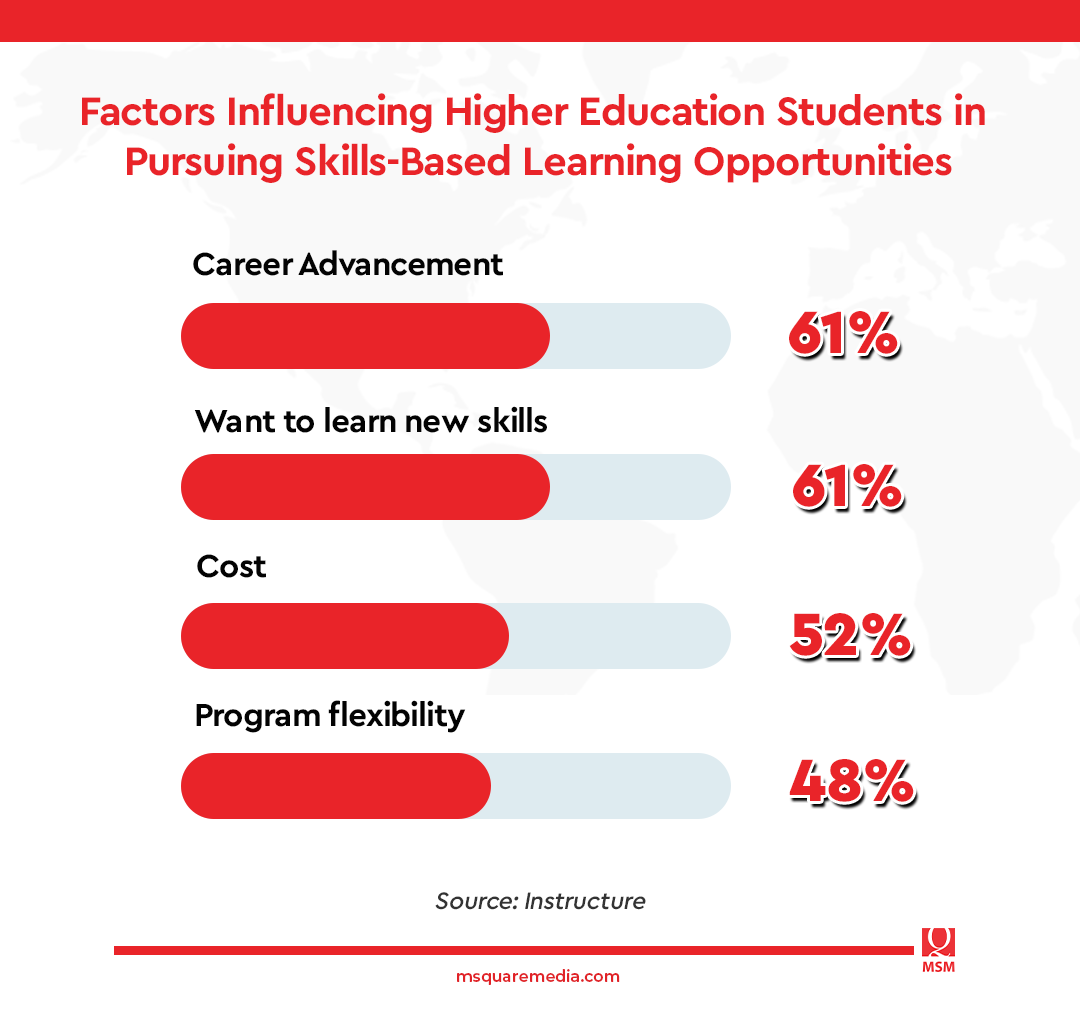Key Takeaways:
- A significant 61% of college students say they want to advance in their careers and acquire new skills, with program flexibility (48%) and cost concerns (52%) being major factors in their decision-making.
- Enrollment at community colleges with strong vocational offerings rises by an impressive 16%, indicating a growing demand for education aligned with real-world career needs.
- More than 50% of the student population prefers fast, affordable skills-based programs, offering institutions a chance to capitalize on stackable certifications and micro-credentials.
Some 61% of college students are eagerly embracing skills-based learning to advance their professions in the context of a changing educational environment. Recognizing the increasing demand for graduates who can adapt and get positions in the fast-paced world of education, students are actively exploring new talents and career pathways.
An August 2023 study by Instructure, in collaboration with Hanover Research, highlights the significant impact that skills-based learning has had in transforming the educational landscape. The opinions of 6,100 people from 17 different countries—students, administrators, and educators—are captured in this fascinating report, which highlights the revolutionary effect of skills-based learning on the changing face of education.
Let’s look behind the numbers and statistics to explore the qualitative aspects of this learning strategy. Through this journey, we uncover important trends and the significant influence of skills-based learning in developing the competencies required for success in the constantly changing professional landscape.
Preparing Higher Education Students Through Skills-Based Learning
Higher education strongly depends on skills-based learning, which aims to equip students with the specific knowledge and skills demanded by today’s business. Customized to meet the needs of each student, these programs draw students for a variety of reasons. The study published in Instructure shows that 61% of students in higher education desire to learn new skills and career progression, standing out as the main motivators.
As indicated in the research, several factors influence the decision to pursue skills-based learning, with 48% program flexibility and 52% cost considerations being two of the most important ones. The study further highlights the value of practical application and ongoing feedback, with 75% and 67% of respondents, respectively, appreciating these aspects of skills-based learning.
When it comes to learning skills, it’s similar to combining academic knowledge with practical application. Imagine attending a school where you could gain practical experience in addition to moving up the career ladder. This is a major change from the traditional approach, emphasizing adaptability and current knowledge acquisition. The schools that understand that graduates need to be prepared for whatever the working world throws at them rather than just focusing on degrees are undeniably impressive in this transformation.

Students Pursue Skills-Based Training for Career Advancement
Imagine that a lot of students are eager to take advantage of possibilities in skills-based programs to advance their careers and broaden their knowledge. That’s a signal for educational institutions to embrace short, low-cost, and powerful teaching strategies like mini-certificates and little diplomas.
With these short programs, students can gain employable skills faster than they might with a traditional degree, which can be more time-consuming and costly. It resembles a customized learning path that moves at the same rapid pace as the workforce.
Schools must provide options like flexible scheduling and online courses for these programs to succeed. To ensure that education meets everyone’s needs, students can mix and match courses to achieve their goals. These days, preparing for real-world issues is more important than obtaining a degree, and the educational institutions spearheading this shift are the ones truly changing the game.
According to another study, over 50% of students say they would look into a skills-based learning program for career advancement and skill development. This trend presents an opening for educational institutions to embrace short, inexpensive, and impactful educational models like stackable certifications and micro-credentials.
Instead of committing to the longer time and higher cost of a standard degree, students can develop skills pertinent to their present and future responsibilities quicker with these non-degree programs, which offer flexible learning pathways targeted around the pace of the sector.
Essential to these programs’ success are flexible choices like online courses and adaptable program structures that enable students to stack courses or certificates into credits toward degree programs, thereby meeting diverse educational needs.
Moving Forward
It is encouraging to see how skills-based learning is progressing and how it is bringing higher education into line with students’ changing needs and goals. This change supports a dynamic educational environment that equips students not only for the current job market but also for future challenges.
We hope to see more partnerships and innovations as we push skills-based learning forward, which will improve the educational process and enable students to succeed in their chosen fields of study as well as in the classroom. Indeed, the future promises exciting opportunities for bridging the gap between academia and industry, ensuring our graduates are resilient, adaptable, and highly sought-after in the global workforce. (RAGHWA GOPAL)

RAGHWA GOPAL
MSM CEO
Raghwa Gopal is a serial entrepreneur, academic, and software engineer by profession. Drawing from extensive business experience, Raghwa joined MSM from British Columbia’s Innovate BC, serving as president and CEO and helping companies start and scale to fuel technology development, commercialization, and adoption. As Accelerate Okanagan’s (AO) former CEO, he was a driving force in development of the tech sector, with a CA$1.6-billion economic contribution.
Raghwa studied at New Zealand’s Central Institute of Technology, Australia’s Collier MacMillan School, and the University of the South Pacific. He has strong ties to higher education as a former lecturer of business at UBC Okanagan, computer science at the School of Arts and Sciences, and entrepreneur-in-residence at Okanagan College School of Business.
His board memberships span across multiple organizations, such as the University of British Columbia, the India Canada Innovation Council, the Women’s Enterprise Centre, and the Province of British Columbia’s Emerging Economy Task Force.
Sources:
- The State of Student Success & Engagement in Higher Education. (2023). Instructure. Retrieved from https://www.csulb.edu/sites/default/files/2023/documents/2023_sohe_stateof_highered_global_ebook.pdf
- Walsh, J. (2023, December 19). Embracing skills-based learning is the key to restoring public trust in higher education. University Business. Retrieved from https://universitybusiness.com/embracing-skills-based-learning-is-the-key-to-restoring-public-trust-in-higher-education/
